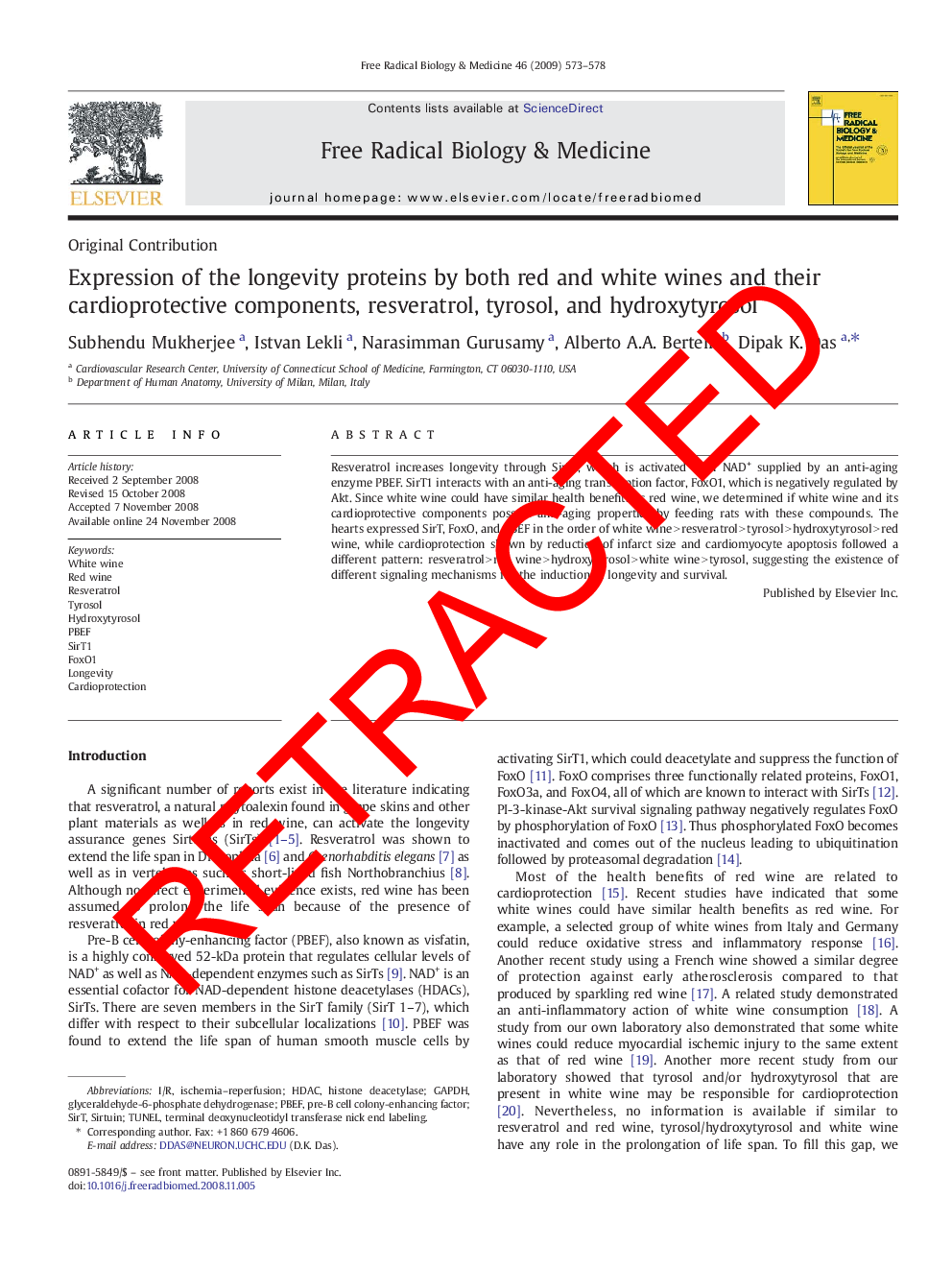| کد مقاله | کد نشریه | سال انتشار | مقاله انگلیسی | نسخه تمام متن |
|---|---|---|---|---|
| 1910291 | 1046763 | 2009 | 6 صفحه PDF | دانلود رایگان |

This article has been retracted: please see Elsevier Policy on Article Withdrawal (http://www.elsevier.com/locate/withdrawalpolicy).This article has been retracted at the request of the Editor-in-Chief.It is with great regret that readers are notified of the retraction of two Free Radical Biology & Medicine papers from the laboratory of Prof. Dipak Das, of the University of Connecticut Health Center in Farmington, Connecticut, USA. The same retraction notice is being applied to both of these papers [Das, S., Khan, N., Mukherjee, S., Bagchi, D., Gurusamy, N., Swartz, H., Das, D.K. Redox regulation of resveratrol-mediated switching of death signal into survival signal, Free Radic. Biol. Med., 44 (2008) 82–90 and Mukherjee, S., Lekli, I., Gurusamy, N., Bertelli, A.A.A., Das, D.K. Expression of the longevity proteins by both red and white wines and their cardioprotective components, resveratrol, tyrosol, and hydroxytyrosol, Free Radic. Biol. Med., 46 (2009) 573–578.The journal Free Radical Biology & Medicine was notified by the University of Connecticut Health Sciences Center of an investigative review of possible scientific misconduct and data manipulation by Prof. Dipak Das. In their investigative review of over 100 papers authored by Prof. Das (abbreviated press release can be found here: http://today.uconn.edu/blog/2012/01/scientific-journals-notified-following-research-misconduct-investigation/), the University of Connecticut concluded that clear evidence of scientific misconduct could be found in several of Prof. Das' publications, including the two Free Radical Biology & Medicine papers (above) that we are now retracting. The Editor-in-Chief charged the journal's Ethics Committee with specifically evaluating these two Free Radical Biology & Medicine papers for which Prof. Das was the senior (responsible) author. The journal's Ethics Committee contacted the University of Connecticut for further details of the specifics of their investigation, and simultaneously conducted its own evaluation of the two Free Radical Biology & Medicine papers concerned.The journal’s Ethics Committee determined, “After reviewing the executive summary from the University of Connecticut, we concluded that the case for scientific misconduct in the two FRBM papers has been solidly established by the University's Committee.” The journal’s Ethics Committee examined the two papers carefully, analyzed the data presented, and then further concluded that “….. on re-examination of these two FRBM papers that they contain clear evidence of obvious cutting, pasting and manipulation of data in experimental blots.” The Ethics Committee recommended, “…..that the Editor-in-Chief begin the process to have these two papers formally retracted in FRBM. We would ask that the retraction statement makes it clear that the articles contain deliberately false information (not simply incorrect information). This would be a service to the scientific community.”Upon due consideration, the Editor-in-Chief fully accepted the Ethics Committee’s conclusions and recommendations and, in conjunction with the Associate Editors, and assisted by our publisher, Elsevier, therefore, decided to formally retract these two papers. The Editor-in-Chief wishes it to be noted that Prof. Das was contacted by the journal’s Ethics committee for comment, and he firmly denied any wrongdoing whatsoever. Despite Prof. Das’ assertions, the journal’s Editors feel there is overwhelming evidence to show that both of the above papers published in Free Radical Biology & Medicine contain deliberately false information. In retracting these two papers, it is the Editors’ hope to deter other scientists, who may have been unaware of their unreliability, from citing them in the future.
Journal: Free Radical Biology and Medicine - Volume 46, Issue 5, 1 March 2009, Pages 573-578